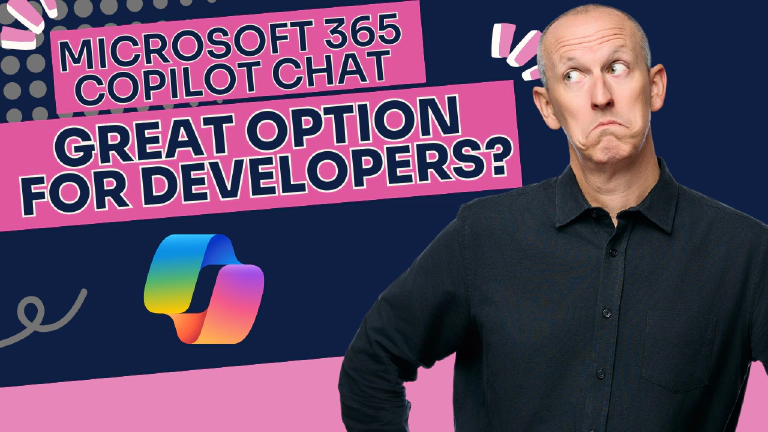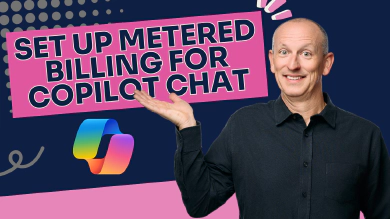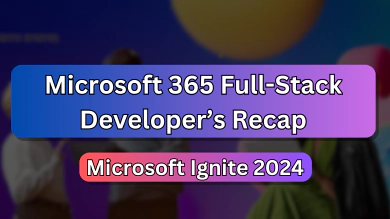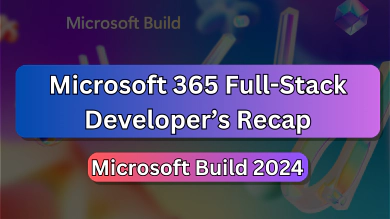It’s been hard not to notice how fast the tech landscape has been changing since OpenAI released ChatGPT in late November 2022. That marked the real dawn of the artificial intelligence (AI) boom across the industry. Even the rapid pace of that speed seems to pale in comparison to how often Microsoft is handling the copilot evolution. Every few weeks Microsoft is either releasing a new feature or SKU, deprecating announcements that aren’t that told, or throwing pricing curveballs.
Gone are the days of major changes being held to one of their big conferences like Build, Inspire, & Ignite. In September 2024 they held their Wave 2, smack between Build in May 2024 & Ignite in November 2024, each of which had plenty of Copilot news.
… and last week was no different!
On Wednesday, January 15, 2024, Microsoft announced a new SKU, Microsoft 365 Copilot Chat. Let’s set aside how the Microsoft naming (and renaming) department came up with yet another terrible name for a moment, this new SKU gives customers another way to get Copilot into the hands of their users without having to license each one under the $360/user/year subscription ($30/user/month but only available with an annual commitment) for a Microsoft 365 Copilot license.

Andrew Connell
Microsoft MVP, Full-Stack Developer & Chief Course Artisan - Voitanos LLC.
There are two angels to consider when comparing Microsoft 365 Copilot & Microsoft 365 Copilot Chat: the feature gap & costs.
The new Microsoft 365 Copilot Chat doesn’t have all the features of Microsoft 365 Copilot, but it has a free component with a pay-as-you-go (PAYG) consumption model, also referred to as “metered”, for some features.
How Microsoft 365 Copilot Chat differs from Microsoft 365 Copilot
The first question I had when I heard this, after the initial frustration of yet another confusing name from the Microsoft naming (and renaming) department, was “how is this SKU different from what we already have?”
The following chart from Microsoft has racked up it’s frequent flier models as it was part of the initial announcement:
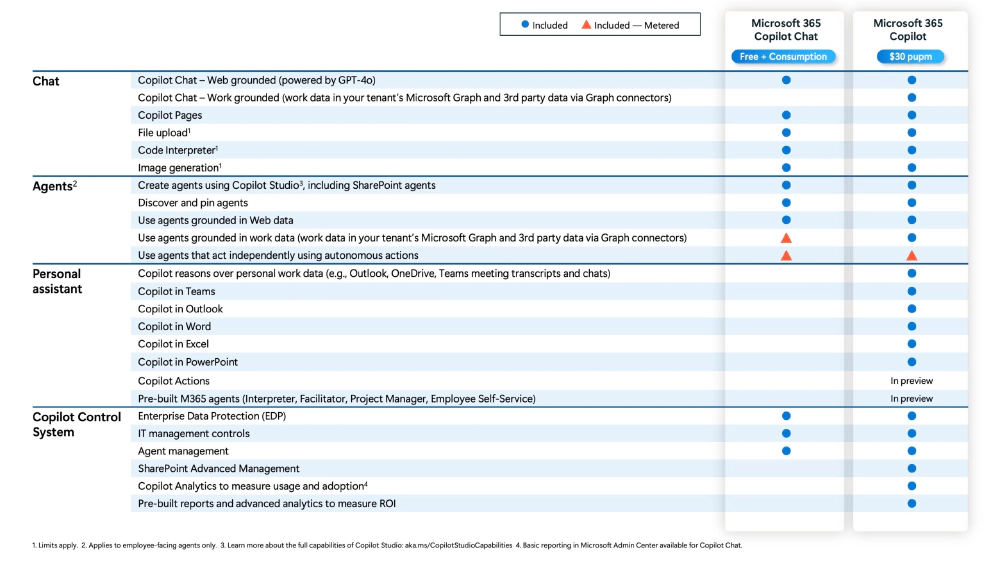
Comparing the Microsoft 365 Copilot & Microsoft 365 Copilot Chat Features
Microsoft 365 Copilot & Copilot Chat Features Compared, from Microsoft’s announcement: Copilot for all: Introducing Microsoft 365 Copilot Chat
There are a few things I want to call out from that chart:
- No work data grounding in Microsoft 365 Copilot Chat: This is the feature in Microsoft 365 Copilot that totes that responses to your prompts are grounded in your organizational data. Organizational data includes content accessible through Microsoft Graph like meeting transcripts, chats, emails, and files in SharePoint as well as content outside Microsoft 365 that’s ingested through Microsoft Graph connectors.
- No app chat in Microsoft 365 Copilot Chat: Notice there’s no access to Copilots in the specific Office applications like Teams, Outlook, Word, Excel, or those pre-built agents announced at Ignite 2024.
- Custom agents can be grounded in work data in Microsoft 365 Copilot Chat… if you pay for it: Microsoft 365 Copilot can use your work data in grounding it’s responses, both in user prompts as well as with custom agents, as part of your user license. To get the same capability with Microsoft 365 Copilot Chat, you’ll need to pay for it on a metered rate of $0.01/message.
How much does Microsoft 365 Copilot Chat Cost?
Let’s explore that last one for a minute… a penny-per-message… let’s put that in context - is it a lot or a little? According to the Microsoft documentation, here’s how messages are calculated based on the events that happen:
| Copilot Event | Billing Rate |
|---|---|
| Classic answers: predefined responses manually authored by agent creators | 1 message |
| Generative answers: created using generative AI models like GPTs | 2 messages |
| Autonomous actions: steps like triggers & topics… these don’t include knowledge search or knowledge retrieval | 25 messages |
| Tenant Microsoft Graph grounding: using RAG to get more contextual responses based on your organizational data | 30 messages |
Each action taken by an agent could utilize multiple message types at the same time. Agents grounded in a tenant with Microsoft graph could use 30 messages for the Microsoft Graph grounding + 2 messages to generate an answer. The more complicated the agent, the more expensive it will be.
For example, consider a sales performance agent that let’s users ask questions based on sales data connected to Microsoft Graph using Microsoft Graph Connectors. If each query to the agent consists of 4 generative answers (42 messages = 8 messages*) and 4 Microsoft grounded messages (4*30 messages = 120 messages), that means each prompt will cost 128 messages.
Let’s say you have 150 users in your org & you’ve licensed 50 of them with Microsoft 365 Copilot user licenses: $30/user/month with an annual commitment. That’s $18,000/year in licensing cost, a fixed cost, but they can run as many of those prompts as part of their license.
But the remaining 100 users in your org aren’t licensed, so they’ll use the PAYG pricing of $0.01 per message. If they ran the same prompt 10% of their working days (24 days a year), assuming they worked 5-days a week for 48-weeks a year, that’s (128 messages * 5 days a week * 48 weeks) * 100 users * 10% of their days * $0.01/message or $3,072 in consumption spend.
So, 50 employees with the all-you-can-eat license will run you $18,000, while 100 employees on the consumption model will run you $3,072 for just that one agent example. I seriously doubt any organizations will have just one agent as once they get that first experience, they’ll create more agents.
This is a great option for a company to try Copilot with it’s users without making the expensive up front annual commitment, but it’s also a great option for developers creating these agents for their customers.
Let me explain…
Microsoft 365 Copilot Chat could be a huge win for developers!
One angle to this new SKU is how it could have a positive impact on developers who want to create agents for Microsoft 365 Copilot & Microsoft 365 Copilot Chat.

"Microsoft 365 Copilot Chat Pricing could be a huge win for Microsoft 365 full-stack developers!"
A challenge, or frustration, I hear from many Microsoft 365 full-stack developers, is the cost associated with getting the licenses you need to develop agents for Microsoft Copilot.
Cost of being a Microsoft 365 Copilot Developer
In order to create agents for Microsoft 365 Copilot (or Microsoft 365 Copilot Chat), you needed that Microsoft 365 Copilot $30/user/month with an annual commitment license in addition to your existing base Microsoft 365 license.
For a a while, Microsoft 365 developers had a good with hose free Microsoft 365 Developer Program Subscriptions that included a Microsoft 365 tenant and 25 * E5 licenses. But in Q1 2024, Microsoft put a stop to that, effectively shutting it down to most developers… and it’s still shut down with nothing but the silent treatment from Microsoft on the ETA when they’ll have a new solution in place.
Understand the recent changes in the Microsoft 365 Developer Program, why they were made, and when you can get a free M365 developer/sandbox tenants again.
https://www.voitanos.io/blog/microsoft-365-developer-program-status-summer-2024/

And even if you were fortunate to be in the Microsoft 365 Developer Program and had one of those tenants, or got it as one of the supported options like a Visual Studio subscription or an ISV program, you still couldn’t get that Microsoft 365 Copilot license as it wasn’t supported on those tenants.
Therefore developer’s only option if they wanted to be a Microsoft 365 developer who created agents for Microsoft 365 Copilot was:
- Buy the Microsoft 365 Copilot user license ($30/user/month with an annual commitment) = $360/user/year
- Buy a Microsoft 365 license supported by Microsoft 365 Copilot, all with annual commitments, such as:
- Microsoft 365 E5: $55.75/user/month = $669/user/year
- Microsoft 365 E3: $33.75/user/month = $405/user/year
- Microsoft 365 F3: $8/user/month = $96/user/year
- Microsoft 365 Business Basic: $6/user/month = $72/user/year
This means your licensing costs for the Microsoft 365 Copilot license will run you anywhere from $432/year with Business Basic up to $1,029/year with an E5.
Microsoft 365 Copilot Chat Opens new options!
The new consumption pricing model is appealing, as it lets developers get around the $360/user/year Microsoft 365 Copilot license.
But the biggest potential benefit is that you can add it to your existing Microsoft 365 Developer Program tenants!
But even if you don’t have a Microsoft 365 Developer Program tenant, for just $72/year (the cost of a Microsoft 365 Business Basic license) you can start building agents.
If you’re doing some agent development, this PAYG model might be a perfect option for you, especially since there’s no annual commitment.
But if you’re doing a LOT of agent development, it might be more cost effective to get the “all-you-can-eat” Microsoft 365 Copilot license… the $30/user/month one. Except you can’t use it with a developer program tenant.
My point we have more options that are going to be more affordable depending on your scenarios.
Ready to give it a try?
While it’s all documented, I found it a little tricky to follow along and get it working, but I’ve documented the steps you need to follow in my article How To Config Microsoft 365 Copilot Chat Consumption Billing.
Learn how to set up pay-as-you-go billing for Microsoft 365 Copilot Chat on your tenant and start building custom agents without the full Copilot license.
https://www.voitanos.io/blog/microsoft-365-copilot-chat-consumption-billing-howto-configure/


Microsoft MVP, Full-Stack Developer & Chief Course Artisan - Voitanos LLC.
Andrew Connell is a full stack developer who focuses on Microsoft Azure & Microsoft 365. He’s a 22-year recipient of Microsoft’s MVP award and has helped thousands of developers through the various courses he’s authored & taught. Whether it’s an introduction to the entire ecosystem, or a deep dive into a specific software, his resources, tools, and support help web developers become experts in the Microsoft 365 ecosystem, so they can become irreplaceable in their organization.
